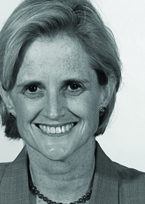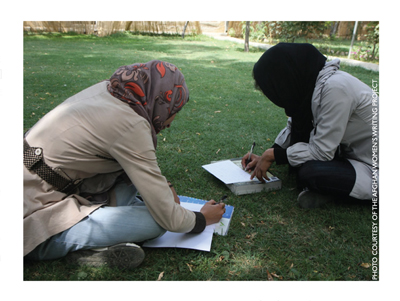The Lives of Others
 Until I met a young woman from Kabul, Afghanistan, named Tabasum, I’d nearly given up on finding my cause. My only child, Lili, had just left for college, and I felt at a loss with no one depending on me. My late husband Gregory and I had adopted Lili—then called Wei Xin Fei—in China, and we both felt it was the most important thing we ever did. People told us we had saved her; we felt she had saved us.
Until I met a young woman from Kabul, Afghanistan, named Tabasum, I’d nearly given up on finding my cause. My only child, Lili, had just left for college, and I felt at a loss with no one depending on me. My late husband Gregory and I had adopted Lili—then called Wei Xin Fei—in China, and we both felt it was the most important thing we ever did. People told us we had saved her; we felt she had saved us.
Soon after Lili’s departure I attended a dinner party where I met Tabasum Wolayat. She had just graduated from Middlebury College in Vermont and was on her way to Oxford University to continue her studies in women’s rights. From there she planned to return to Kabul to help other women. I interrogated her, as my daughter says I always do, but Tabasum handled it graciously. “I’m just interested in the lives of others,” I always tell Lili.
Tabasum made it to college in the United States against all odds; she spoke little English, had no money, and had never been outside of Afghanistan. How could this be? How did she manage to get herself out of Kabul and into an academically rigorous U.S. college, and then to Oxford? The answer is she did it on her own. She had worked as a freelance reporter for the BBC in Kabul as a high school student, and one of her colleagues, Bilal Sarwary, had graduated from Middlebury and helped her make connections there. Tabasum applied and was accepted. The other dinner guests and I were speechless as we listened to her story. Speechless and perhaps a little guilty, given all that we had and took for granted.
I decided then and there that since Tabasum would soon be off to England (safely away from my incessant questions), I’d like to find other young Afghan women I might help. An Internet search led me to a mentorship with the Afghan Women’s Writing Project (AWWP), founded in 2009 by American journalist and novelist Masha Hamilton to support the voices of women with the belief that telling one’s story is a human right.
 “Because in telling their own stories, we’ve seen these women gather strength, courage, and self-confidence,” reads the mission statement of the AWWP. “They become empowered to make change within their homes, their communities, and eventually their country. They also gain computer literacy and skills of language and critical thinking, which increases their job-related skills.” The AWWP reports that its participants have become lawyers, journalists, and even members of parliament.
“Because in telling their own stories, we’ve seen these women gather strength, courage, and self-confidence,” reads the mission statement of the AWWP. “They become empowered to make change within their homes, their communities, and eventually their country. They also gain computer literacy and skills of language and critical thinking, which increases their job-related skills.” The AWWP reports that its participants have become lawyers, journalists, and even members of parliament.
My mentorship began with Nasima’s story.
“Dear Respect my moderator, Please kindly find the attached,” Nasima e-mailed me. Her English was weak, but I’d been instructed not to focus on that. The point was to provide encouragement, praise, and admiration, along with gentle suggestions for making the writer’s story stronger.
As I began the latest installment of her life story, I was confused. The first line read, “My sin was that I had fled from oppression!” I assumed this meant that she left an abusive husband and went into hiding. I knew from her previous two installments that she was born in 1985 in a refugee camp in Iran. She spent three years in the camp until the family was expelled in 1989 and returned to their own country.
In the second installment, she married a man she loved and suffered two miscarriages due to his beating her. She learned he had another wife. She left him, and two months later had a baby boy. She put all her hope and dreams into her son. He is her life, as Lili is mine.
How surreal it is, I thought, that I am communicating via secure email with a young woman in a country I know little about beyond the headlines. Her story was so wrenchingly painful that I could only read small sections at a time.
What can I possibly write to her? I asked myself. How can I even presume to understand her life? I must be careful not to offend her, or she might stop writing. So I wrote words of praise.
“They wanted to put me in prison,” she wrote. “My sin was that I wanted life, life without pain, suffering, and sorrow. It was my sin that I lifted my voice and I wanted the women’s rights.”
I longed to meet Nasima, hold her and comfort her. But of course I never will. I looked forward to her response to my suggestions and hoped she would continue to write, to “talk to the world,” as one writer described it.
Next came Seema. I provided concrete suggestions to strengthen her poem, and she emailed me. “Wooohooo!!! Thank you so much dear Liz. I am very happy, it is perfect! I love it. I really appreciate your concerns and your nice comments. I am glad having you : ).” Oh, how I loved reading “Wooohooo,” an expression Lili often uses.
Seema and Norwan and the other women I mentored—Aisha, Basbibi, Humaira, Nasima, Rahela, Seeta, and Yalda—gave me far more than I gave them. They gave me my cause. I feel I am more a part of the world beyond the comforts of my American life. AWWP has asked me to mentor again, and I am thrilled. And so with Lili in college, I have other young women who need me. Wooohooo!
Please let the Afghan women writers know their voices are being heard by logging onto the Afghan Women’s Writing Project at awwproject.org and leaving comments.![]()
